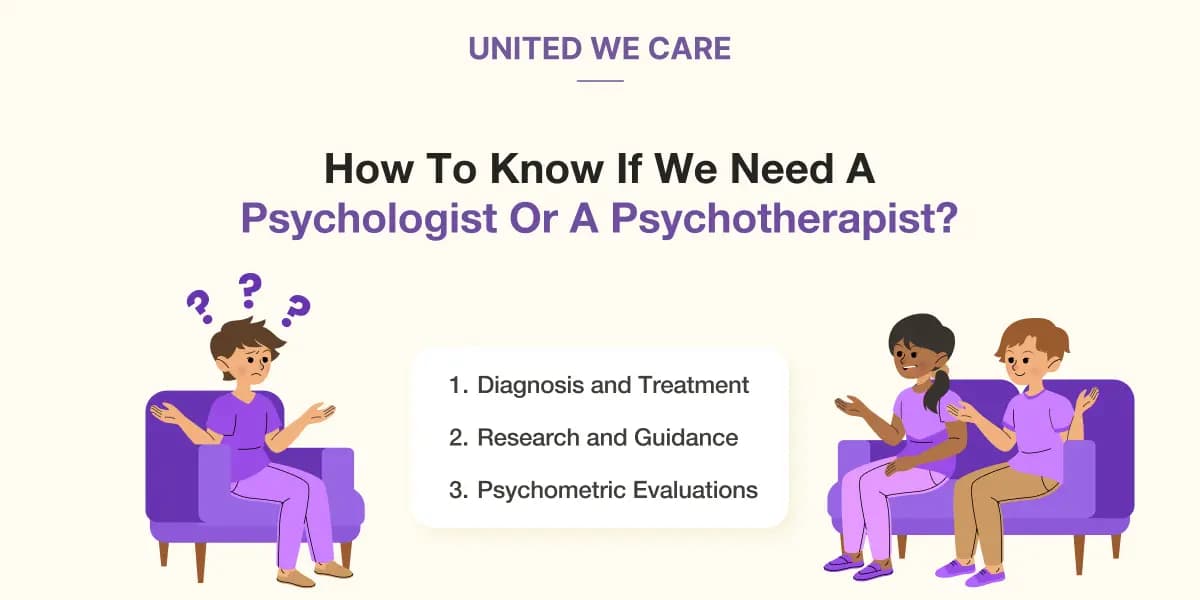Introduction
It is common to be confused between the terms psychologist and psychotherapist since both sound pretty similar. Moreover, there is a general lack of awareness and stigma related to mental health. As a result, people tend to get the terms mixed up and have difficulty identifying the right professional to go to.
In this article, we’ll explain in detail what these two professions involve. Hopefully, this information will guide you on what your next step should be.
Who Is A Psychologist?
A psychologist is a professional in the field of mental health. Generally, this means that the person has an educational background in psychology. As it is a versatile profession, the scope of work varies. A psychologist’s work may involve research, teaching, guidance and counseling, psychometrics, and consultations. They may also be associated with schools, universities, hospitals, rehabilitation centers, corporations, and institutes. Typically, one can think of a psychologist as an individual with specialized knowledge in the area of behavioral sciences.
Who Is A Psychotherapist?
On the other hand, a psychotherapist is further specialized in talk therapy. This is the type of treatment for mental illnesses that involves speaking about life and challenges. Usually, a psychotherapist has a post-graduate degree in psychology along with training in various kinds of therapy and treatment. Usually, a psychotherapist’s work is more focused on clinical issues, but some professionals conduct research as well. They may be working in a hospital, clinic, or private practice.
How To Know If We Need A Psychologist Or A Psychotherapist
Understandably, a lot of people struggle to decide whether they need to consult a psychologist or a psychotherapist. The nature of work in both professions overlaps, making it a bit confusing. In this section, we’ll discuss some of the aspects that will help you know if you need a psychologist or a psychotherapist.

Diagnosis and Treatment
One common need that people have from mental health professionals is the diagnosis and treatment of mental illness. If you are wondering whether you have a particular psychological disorder, you would benefit from consulting a psychotherapist.
A psychotherapist is basically a psychologist with further specialized training. They will be able to provide you with an official diagnosis. Furthermore, they will be equipped to offer you the treatment and specific therapy required.
Research and Guidance
Perhaps you wish to be a part of some psychological research or need to consult an expert to conduct a project involving behavior. In that case, it is better to approach a psychologist as their work is more focused on that.
Additionally, it could also be that you just need a professional to guide you with some mild to moderate mental health issues. Maybe you don’t have a serious psychological disorder but still need some guidance. Consulting a psychologist for this is a good idea.
Psychometric Evaluations
Psychometrics is the study of the measurement of psychological aspects. Sometimes, you might find yourself in a situation where you need to conduct a psychometric evaluation. For example, maybe you need to submit a certificate or document signifying your level of competence, disability, sobriety, fitness, or well-being.
If you have a general issue to address, consulting a psychologist would be appropriate. But for more specific concerns, such as a particular diagnosis, it’s best to seek guidance from a psychotherapist.
Difference Between Psychologist Vs Psychotherapist
So, based on what we just covered, you probably have a decent grasp of the psychologist versus psychotherapist thing. Now, let’s dive a bit deeper and spell out the exact differences between these two professions.
Academic vs. Clinical Roles
Psychologists usually spend a lot of their time in academia, doing research and teaching. Meanwhile, psychotherapists are more focused on hands-on clinical work and providing talk therapy. While psychologists may contribute to research, psychotherapists primarily focus on working directly with clients.
Counseling: Psychologists vs. Psychotherapists
Likewise, psychotherapists primarily engage in individual, group, couple, and family therapy sessions. Although psychologists also offer counseling, it tends to be more generalised and aimed at addressing mild to moderate psychological issues. For individuals dealing with more severe disorders and comorbidities, seeking assistance from a psychotherapist is typically recommended.
Education Requirements: Psychologists vs. Psychotherapists
One last key difference between psychologists and psychotherapists lies in their educational background. Becoming a psychologist typically requires a bachelor’s degree in psychology or behavioural sciences. However, to practise as a psychotherapist, one must pursue further education beyond a bachelor’s degree. This often involves obtaining a post-graduate diploma or master’s degree in psychology. Alternatively, some may pursue a Doctorate of Medicine in Psychiatry as another career path to become a psychotherapist.
Conclusion
It can be quite confusing when navigating whether to consult a psychologist vs psychotherapist. That’s because there are overlapping aspects between both professions, and there is also a general lack of awareness regarding mental health professionals.
A psychologist is more focused on academia, guidance and counseling, research, and consultations. Contrastingly, a psychotherapist has further specialization in talk therapy and other psychological therapies. You can find both kinds of professionals through the United We Care app and get yourself the help you need.
References
[1] Humphreys, K., 1996. Clinical psychologists as psychotherapists: history, future, and alternatives. American Psychologist, 51(3), p.190.
[2] Mair, M., 2013. Between Psychology and Psychotherapy (Psychology Revivals): A Poetics of Experience. Routledge.
[3] Radeke, J.T. and Mahoney, M.J., 2000. Comparing the personal lives of psychotherapists and research psychologists. Professional Psychology: Research and Practice, 31(1), p.82.










